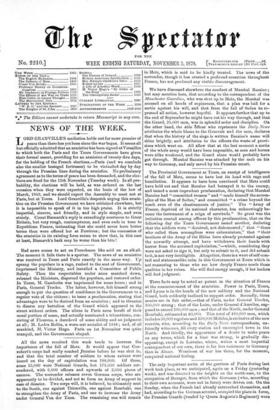Three facts may be noted as patent in the situation
of France at the commencement of the armistice. Power in Paris, Tours, and Lyons is in the hands of the new soldiery and the National Guard, both evidently inclined to support order. Secondly, three armies are in fair order,—that of Paris, under General Trochu, 300,000 strong ; that of the Loire, under General d'Aurelles, sup- posed to exceed 100,000 men ; and that of the North, under General Bourbaki, estimated at 80,000. This total of 480,000 men, which includes 50,000 regulars and 250,000 Mobiles, is exclusive of the new recruits, who, according to the Daily News correspondents, un- friendly witnesses, fill every station and unoccupied town in the North. And thirdly, the appearance of a desire to make peace on any terms, which for a time was strong, is gradually dis- appearing, except in Lorraine, where, writes a most impartial correspondent of our own, there is far less resistance to Germany than in Alsace. Weariness of war has there, for the moment, conquered national feeling.


































